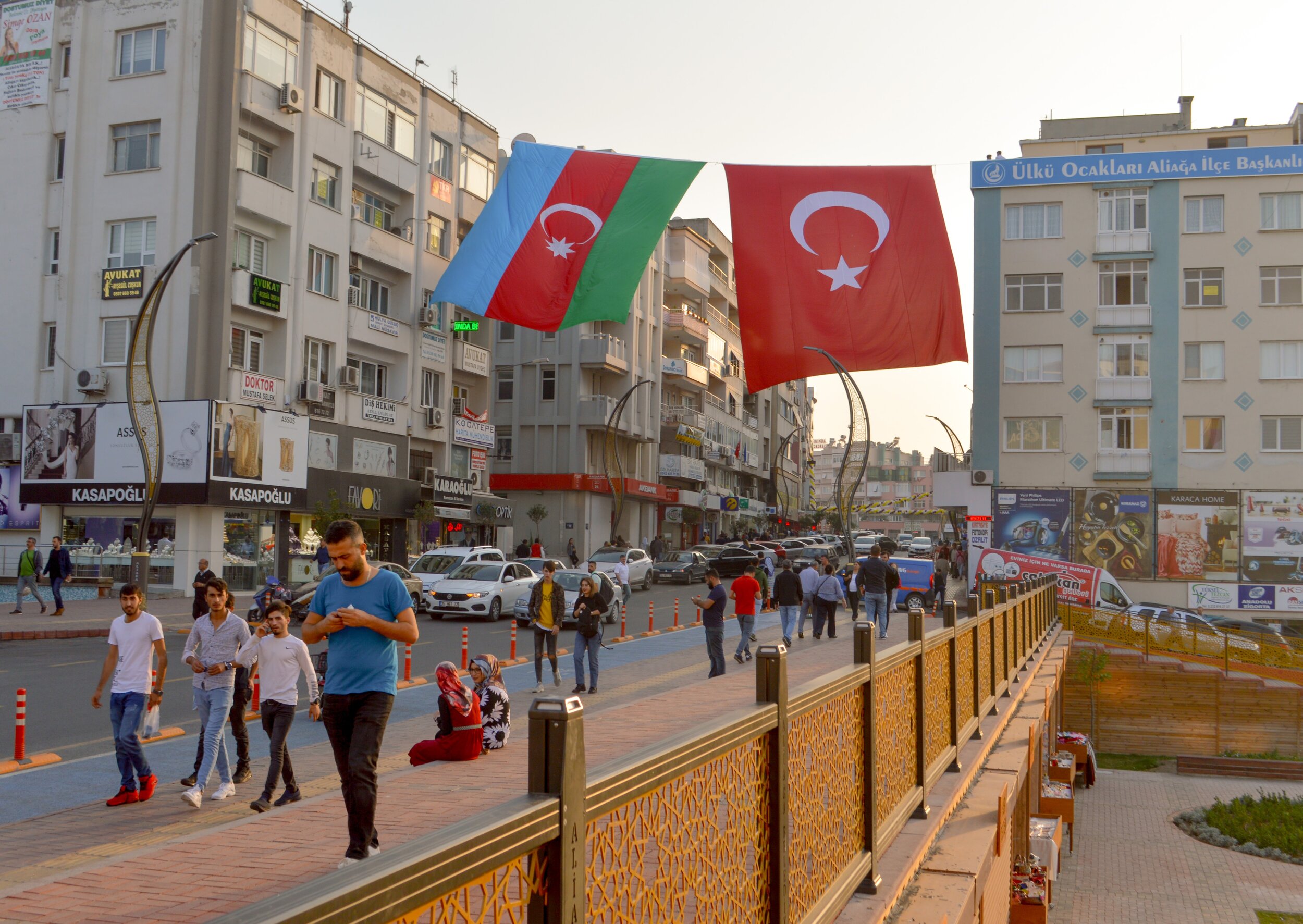Azerbaijan is filled with incredible natural wonders and diverse land formations, yet it’s often overlooked by travelers who are unaware of the beauty it holds. Nicknamed “the land of fire,” it is home to Yanar Dağ (meaning “burning mountain”), a mountain near the Caspian Sea that hosts a naturally burning gas fire that has remained alight for over 65 years. Much of its architecture is built in harmony with the natural landscape; with churches carved into cliff sides and villages nestled in lush valleys. This video takes you through Azerbaijan, past rugged cypress forests, cascading waterfalls, and cliffs that blaze like fire when hit by the sun.
A Glimpse at Azerbaijan, Central Asia’s ‘Land of Fire’
Although a relatively new nation, Azerbaijan’s multifaceted culture from its historic tea rituals to its unique pomegranate festival makes it especially intriguing.
A mountainous region in Azerbaijan. Pozziss. CC0.
Azerbaijan, a former Soviet republic located in the southern Caucasus, stands as a diverse and exquisite country. Although the Russian imperialism of the past retains some influence, the “Land of Fire” prides itself on its many unique traditions which can be fully experienced today.
Tea Rituals
Black tea served in an armudu. Idin Ebrahimi. Unsplash
Tea is a prevalent part of Azeri culture, to the extent that it is served with every meal. The locals predominantly drink black tea and serve it in a pear-like glass called an armudu. This tradition was passed down from medieval times, when black tea was taken alongside a sugar cube to avoid assassination, as sugar tends to react with potential toxins in the drink. This tradition continues even today, as locals can be seen taking a bite of a sugar cube before sipping their tea.
The Importance of Fire
Temple of Fire in Baku. Diego Delso. CC BY-SA 4.0
Azerbaijan is also known for its national symbol of fire, and the country is recognized as a place where “the sacred fire is preserved.” “Azer” in Persian means “fire,” and the entire country is known as the “Land of Fire.” Although the exact reason behind this cannot be tracked to one specific moment, there are various potential reasons for why fire holds such a special place in this nation. First, although a large proportion of Azeris are Muslim, Zoroastrianism still holds a large influence on Azerbaijan. Zoroastrianism focuses on the worship of fire, water, Earth and wind. Thus, respect for nature is highly ingrained within Azeri culture. Moreover, the country’s “huge underground gas deposits” commonly lead to natural flames.
Food
Azeri dish known as kelem dolmasi. CC BY 3.0
Food is also a large part of Azeri culture, and one can find an array of distinct, delicious and healthy dishes. The reason for this is the large farming culture in Azerbaijan, which is possible due to the country’s extensive tracts of fertile land. This means that the nation grows a multitude of vegetables and fruits, with flavorful meats and herbs rounding out Azeri meals. Due to Azerbaijan’s vibrant culinary scene, food is given a high position in culture, where sharing food with another person is a sign of friendship.
Goychay Pomegranate Festival
A booth at the Goychay Pomegranate Festival. Moonsun1981. CC BY-SA 3.0
Although many fruits are popular in Azerbaijan due to its fertile land, pomegranates are given the highest title as the symbol for love, luxuriance and eternal life. To commemorate the importance of this fruit, a pomegranate festival known as Nar Bayrami is celebrated every November in the city of Goychay, where over 50,000 tons of pomegranates are produced annually. Guests in this festival are welcomed by locals with an array of pomegranate dishes ranging from jams to baked goods to juices. Moreover, during the festival many vendors set up their shops with distinct varieties of this fruit. Other festivities include traditional dancing, instrumental music by local musicians, and competitions such as picking out the heaviest pomegranates from the lot.
Strides Toward Gender Equality
Kalbajar School in Azerbaijan. World Bank Photo Collection. CC BY-NC-ND 2.0
In 1918, Azerbaijan became the first country in the Islamic world to give women the right to vote. Gender equality comes partly as a legacy of Russian imperialism, as the culture placed large importance on respecting women. Women’s equality continues to be a notable social norm in Azerbaijan, and it is normal for Azeri women to hold positions of political power. On a day-to-day basis, men commonly offer their seats to women and hold the door for them.
Gracious Hospitality
Two Azeri women picking out tomatoes. Asian Development Bank. CC BY-NC-ND 2.0
Generous behavior isn’t only reserved for women in Azerbaijan; it extends to guests as well. Hospitality is a common trait across the majority of Azeri citizens, who are often willing to provide shelter and food to their guests, regardless of the trouble they must go through. If one receives the luxury of going to a Azeri’s home, they should remember to take off their shoes before entering, and to remain standing until told where to sit. Moreover, as Azerbaijan is renowned for its food, guests should not refuse a serving as that may be misunderstood as a rude gesture.
In all, Azerbaijan’s riveting culture makes it an intriguing nation to visit. Despite its minuscule size, the country has much to offer to those willing to take a chance on it.
WANT TO LEARN MORE? CHECK OUT THIS VIDEO AND EXPLORE THE MAGNIFICENCE OF AZERBAIJAN.
Swati Agarwal
Swati is a sophomore at University of California, San Diego, where she is studying Environmental Sciences and Theatre. Although born in India, she was raised in Tokyo, which gave her the opportunity to interact with diverse people from distinct cultures. She is passionate about writing, and hopes to inspire others by spreading awareness about social justice issues and highlighting the uniqueness of the world.
Unpacking the Nagorno-Karabakh Conflict and the Armenian Diaspora
The renewed conflict in the South Caucasus region has its roots in long-standing historical divisions between Turkey and Armenia.
A view of Mount Ararat. West. CC2.0
Tensions between Azerbaijan and Armenia have been renewed due to the ongoing territorial dispute over Nagorno-Karabakh. Fighting started up again on Sept. 27 and has caused massive upheaval and casualties on both sides. Backed by Turkey, the Azerbaijani military bombed Nagorno-Karabakh’s regional capital of Stepanakert with intense artillery fire, while Armenia launched missiles at Ganja (Azerbaijan’s second-largest city), putting citizens in grave danger. Officials speculate that the last two weeks of fighting have proven to be the worst since a cease-fire was brokered by Russia in 1994. Although another cease-fire is a possibility, there is no prediction of what will come next. “Don’t discount the possibility of this turning into something much larger,” said Kevork Oskanian from the University of Birmingham in England. “Once a conflict like this kicks off, it has a dynamic of its own and you don’t know where it will go.”
A Brief History of the Nagorno-Karabakh Dispute
A map of the Nagorno-Karabakh region. Achemish. Wikimedia Commons. CC4.0
The recent fighting is a result of a renewed 32-year-long military conflict between Azerbaijan and Armenia. The territory of Nagorno-Karabakh, also known as Artsakh to Armenians, contains a population of about 150,000. Although completely surrounded by Muslim-majority Azerbaijan, it is governed and claimed by Christian Armenians. Josef Stalin gave the territory to Azerbaijan in 1921 and made it an autonomous region two years later. Initially, the territorial dispute was not violent, as both Armenia and Azerbaijan were under the stronghold of the Soviet Union. However, nationalistic and militaristic tensions increased between the two nations when the USSR began to dissolve. The fighting began in 1991, which resulted in 30,000 casualties and over one million displaced. Although a cease-fire was agreed to in 1994, no official peace deal has been reached. Armenia is happier with the status quo than Azerbaijan, as it was able to reclaim 20% of surrounding land during the fighting in the ‘90s (shown in yellow on the map above). However, Azerbaijan still has a large population of people displaced by the fighting who want to return to their homes.
Why Turkey is Supporting Azerbaijan
Azerbaijani and Turkish flags in Izmir, Turkey. Anzola. CC 2.0
Azerbaijan is often referred to as a little brother to Turkey, due to the two nations’ connections through cultural, linguistic and religious ties.The two have a relationship built on trade and mutual exchange. Azerbaijan provides a large portion of Turkey’s gas and oil, where the money in return is used to buy weapons from Turkey. Azerbaijan is currently using military weapons provided by Turkey to strike Nagorno-Karabakh, allowing Turkey to increase its political presence in the region. Underpinning Turkey’s involvement in the conflict are the events of 1915, where 1.5 million Armenians were killed under the direction of the Ottoman Empire (present-day Turkey), which many consider a genocide but Turkey denies. Many Armenians see Azerbaijan’s alliance with Turkey as a resurfacing of these events, providing an ultimate threat to their existence and statehood.
The Conflict Reaches the Armenian Diaspora
An Armenian church in Los Angeles. Steeds. CC2.0
Although Armenia has a population of 3 million, the diaspora population is estimated to be much larger, with notable communities in Australia, Russia, Lebanon, France and Southern California. Although the events of 1915 resulted in mass migrations of Armenians around the world, the diaspora goes as far back as the Middle Ages. Throughout history, many Armenians migrated to new corners of the world due to political upheaval. Armenian merchants often traveled to trade and sell wares, playing a key role in the economies of China, India and Persia. Armenia’s long history of migration and displacement has resulted in a strengthened cultural identity in diaspora communities. Many notable Armenian celebrities, including Kim Kardashian and Serj Tankian, are strong proponents of the Armenian cause, posting on social media to raise awareness of the Nagorno-Karabakh dispute. Armenian lobby groups have held protests in Southern California, as well as asking Armenian-Americans to bring awareness of the conflict to representatives and congresspeople. Some Armenians even contemplate returning to their country to fight Azerbaijan. According to Alex Galitsky, part of the Armenian National Committee of America’s western region, “I think a lot of people see themselves as bearing some responsibility for the defense of our nation.”
The conflict in Nagorno-Karabakh continues to escalate as nationalistic and militaristic tendencies fuel both sides. True peace will only be reached if Turkey, Armenia and Azerbaijan are willing to begin the difficult work of listening and embracing each other’s conflicting histories and narratives.
Megan Gürer
Megan is a Turkish-American student at Wellesley College in Massachusetts studying Biological Sciences. Passionate about environmental issues and learning about other cultures, she dreams of exploring the globe. In her free time, she enjoys cooking, singing, and composing music.













